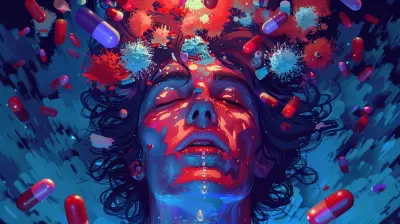Bipolar Disorder in Adolescents: What Parents Should Know
2 October 2025
Adolescence is already a rollercoaster of emotions, mood swings, and self-discovery. But when bipolar disorder comes into play, everything turns even more unpredictable. As a parent, watching your teen struggle with extreme highs and crushing lows can be overwhelming. What’s normal teenage behavior, and what’s a sign of something more serious?
Understanding bipolar disorder in adolescents is crucial for early intervention and effective management. Let's dive deep into what you need to know about this complex condition and how you can support your child.

What Is Bipolar Disorder?
Bipolar disorder is a mental health condition that causes extreme mood swings, shifting between emotional highs (mania or hypomania) and deep lows (depression). These mood shifts go beyond the typical ups and downs of teenage life and can significantly impact daily functioning.Types of Bipolar Disorder
There are three main types of bipolar disorder:- Bipolar I Disorder – Characterized by severe manic episodes lasting at least a week, often followed by periods of depression.
- Bipolar II Disorder – Involves hypomanic episodes (less severe than full mania) combined with episodes of major depression.
- Cyclothymic Disorder (Cyclothymia) – A milder form of bipolar disorder with frequent mood swings but without full-blown manic or depressive episodes.

Signs and Symptoms of Bipolar Disorder in Adolescents
Teenagers can be moody by nature, so how can you tell if it's bipolar disorder? Here are some red flags to watch for:Manic Episodes (The Highs)
- Feeling overly happy, energetic, or euphoric for long periods- Talking extremely fast, jumping from one idea to another
- Decreased need for sleep without feeling tired
- Risky behavior (reckless spending, substance abuse, dangerous activities)
- Unrealistic belief in their abilities or self-importance
- Being easily distracted
Depressive Episodes (The Lows)
- Persistent sadness or hopelessness- Loss of interest in previously enjoyed activities
- Fatigue and low energy levels
- Difficulty concentrating or making decisions
- Changes in appetite and sleep patterns
- Thoughts of self-harm or suicide
The tricky part? Teens can experience mixed episodes—where they feel energized but depressed at the same time. This makes diagnosing bipolar disorder even more challenging.

What Causes Bipolar Disorder in Adolescents?
There’s no single cause, but several factors can contribute:- Genetics – If bipolar disorder runs in the family, the chances of developing it increase.
- Brain Chemistry – An imbalance in neurotransmitters (brain chemicals) can trigger mood episodes.
- Environmental Factors – Stressful life events, trauma, or substance abuse can play a role.
While you can’t prevent bipolar disorder, understanding these triggers can help manage symptoms more effectively.

How Is Bipolar Disorder Diagnosed in Teens?
Diagnosing bipolar disorder in adolescents is tricky because their moods naturally fluctuate. A doctor or mental health professional will typically:- Conduct a thorough medical and psychiatric evaluation
- Review family history of mental health conditions
- Observe mood patterns and behavioral changes over time
- Rule out other conditions like ADHD, depression, or anxiety disorders
It’s essential to get a proper diagnosis early. Left untreated, bipolar disorder can lead to academic struggles, substance abuse, and strained relationships.
Treatment Options for Bipolar Disorder
There’s no one-size-fits-all treatment, but a combination of approaches can help manage the condition.1. Medication
Mood stabilizers (like lithium), antipsychotics, and sometimes antidepressants are commonly used to treat bipolar disorder. However, finding the right medication can take trial and error. Always work closely with a psychiatrist to monitor side effects and effectiveness.2. Therapy
- Cognitive Behavioral Therapy (CBT) – Helps teens recognize and manage negative thought patterns.- Family Therapy – Involves parents and siblings to create a support system at home.
- Psychoeducation – Educates teens and their families about bipolar disorder, so they can better understand and cope with it.
3. Lifestyle Changes
Simple daily habits can make a huge difference in managing mood swings:- Maintaining a consistent sleep schedule
- Engaging in regular physical activity
- Avoiding drugs and alcohol
- Practicing stress-reducing techniques like mindfulness or journaling
How Can Parents Support a Teen with Bipolar Disorder?
Watching your child struggle with bipolar disorder can feel frustrating and even heartbreaking. But your support can be a game-changer. Here’s how you can help:1. Educate Yourself
The more you understand bipolar disorder, the better you can support your teen. Read books, attend support groups, or connect with mental health professionals.2. Keep Communication Open
Teens may not always want to talk, but let them know you're there. Avoid judgment, listen actively, and encourage them to express their feelings.3. Help Them Stick to Their Treatment Plan
Medication and therapy work best when followed consistently. Encourage your child to take their meds as prescribed and attend therapy sessions.4. Watch for Warning Signs
Be aware of sudden mood changes, risky behaviors, or talk of self-harm. If you're concerned, seek professional help immediately.5. Take Care of Yourself Too
Caring for a child with bipolar disorder can be draining. Don’t neglect your own mental health—seek support when needed, whether it’s from a therapist, support group, or trusted friends.When to Seek Immediate Help
If your teen ever talks about self-harm, suicide, or engages in reckless behavior, don’t wait—seek immediate help. Call a mental health professional, crisis hotline, or take them to the nearest emergency room. It’s always better to be safe than sorry.
Final Thoughts
Bipolar disorder in adolescents is complex, but with the right support, treatment, and coping strategies, it's manageable. As a parent, your role is to be a source of stability, understanding, and encouragement.Your teen isn’t defined by their diagnosis. With proper care, they can still lead a fulfilling and healthy life. Stay patient, stay informed, and most importantly, stay by their side.
all images in this post were generated using AI tools
Category:
Bipolar DisorderAuthor:

Jenna Richardson
Discussion
rate this article
1 comments
Troy McTigue
This article is a valuable resource for parents navigating the complexities of bipolar disorder in adolescents. Understanding the signs, treatment options, and supportive strategies can empower families to foster resilience and promote mental well-being during these critical years.
October 6, 2025 at 3:35 PM

Jenna Richardson
Thank you for your kind words! I'm glad you found the article helpful in supporting families during this important journey.


